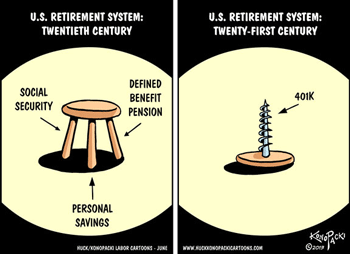Is There A Pension Crisis?

Our guest author today is David Cay Johnston, a distinguished visiting lecturer at the Syracuse University College of Law and a former Pulitzer prize-winning financial reporter at The New York Times. This article is adapted from his remarks to an ASI-sponsored conversation on the topic in March, which also included remarks from Chad Aldeman, Teresa Ghilarducci, and Dan Pedrotty. A video of this event can be found here.
So the question is whether there is a pension crisis. The answer is yes, absolutely. It’s just not the one that politicians always talk about.
Contrary to that you hear about on TV, in market economics, defined benefit pensions are the second most efficient way to provide for income in old age. The most effective way would be a national program that spreads risks to everyone. The least efficient way to do it is through defined contribution plans.
There is abundant evidence for this. Defined contribution plans work very well, but only as supplements for prosperous people such as me and my wife, who is a public charity CEO, they are not at all effective for most people. That’s be because defined contribution plans violate specialization, one of the most basic tenets of market economics as taught to us by Adam Smith, the man who first explained market economics.
How many of you would perform surgery on yourself or your spouse? Or dentistry? How many have learned the hard way that doing your own plumbing makes for inefficiencies and creates a mess? But when we move to defined contribution plans, if retirees have any plan at all, we make the assumption that everyone is competent to be an investment manager, and they are not.
In fact, retirees managing their own plans tend pay higher prices than necessary and their investing performance is atrocious. In down markets, defined contribution plans lose about 25 percent more than professionally managed defined benefit pension plans. And in up markets, they earn about 25 percent less. To think that most people can be specialists in every field is to defy one of the defining principles of modern wealth creation.
So why are defined benefit pension plans being described everywhere as being in a state of crisis? The answer is very simple: systematic theft.
Pensions and other retirement benefits are nothing more than wages. They are wages that could have been taken today, but instead are deferred for old age. We often hear politicians talk about “contributions” to the plan, and this creates the misimpression that they are a gift or a gratuity. They are not. Workers receive a certain level of compensation, often referred to as a package. How that package is divvied up – how much is paid immediately in cash wages, how much goes for vacations, how much goes for sick leave, how much goes for health insurance, and how much goes into a retirement plan – is mere semantics, it’s not economics (for more on this, see here).
As both a legal and an economic principle, all the money in any pension plan has been earned by the workers. Now, I’ve talked about this before and people immediately respond “But the taxpayers put the money in for teachers, now didn't they?” No, they did not.
Taxpayers exchanged their dollars for the work of the teachers and, once the teachers are paid, it is their money. They earned it. This is true for bridge engineers and state troopers and everybody else who has a job. Pensions are earned. If they were not the system would be a huge criminal enterprise in which gifts of public money were made to the workers.
Accounting systems are often set up to disguise this fact. Congress participates in this confusion through how it handles the payroll tax – people believe that there is a matching contribution to their Social Security fund. The law is even called FICA, the Federal Insurance Contributions Act. But in fact, that is Is There A Pension Crisis? | Shanker Institute:
